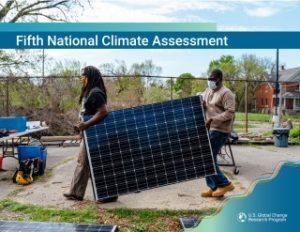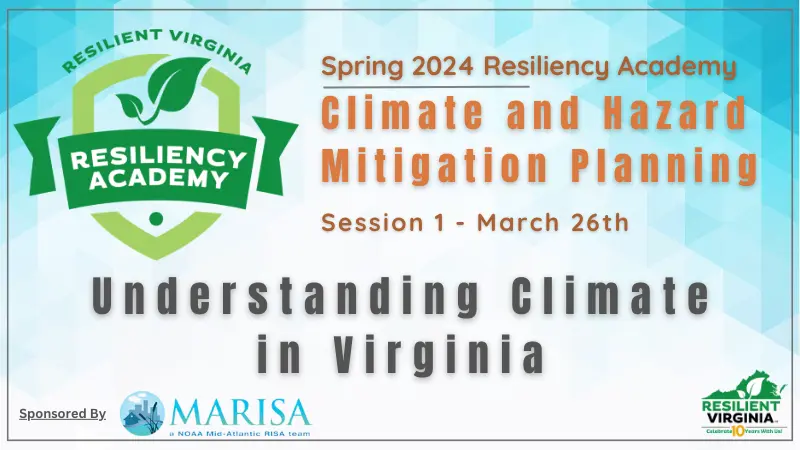Written by Ann Randolph Whitlow
 The release of the Fifth National Climate Assessment (NCA5) heralds a critical moment for the United States, where the very fabric of our communities and landscapes is under threat. As we dive into the findings of this comprehensive report we uncover a sobering, yet very real truth: Virginia is on the front lines of climate change, facing intensifying heat waves, rising sea levels, and increasingly volatile weather patterns. According to the report, the frequency of billion-dollar weather disasters has increased significantly in the past few decades. In the 1980s, such disasters occurred every four months on average, but now they happen every three weeks.
The release of the Fifth National Climate Assessment (NCA5) heralds a critical moment for the United States, where the very fabric of our communities and landscapes is under threat. As we dive into the findings of this comprehensive report we uncover a sobering, yet very real truth: Virginia is on the front lines of climate change, facing intensifying heat waves, rising sea levels, and increasingly volatile weather patterns. According to the report, the frequency of billion-dollar weather disasters has increased significantly in the past few decades. In the 1980s, such disasters occurred every four months on average, but now they happen every three weeks.
From the rolling hills of the Appalachians to the shores of the Chesapeake Bay, the Southeastern U.S. topography mirrors its rich tapestry of culture and heritage. Yet, beneath this beauty lies a landscape scarred by historical injustices and systemic inequities. The report on the Southeast Chapter of NCA5 paints a vivid picture of the challenges facing our region and sheds light on how these legacies have left certain communities more exposed to climate risks. Recognizing and addressing these injustices is paramount to ensuring equitable resilience-building efforts moving forward.

The NCA5 highlights the challenges that communities across the Commonwealth face due to extreme weather events such as hurricanes, floods, and wildfires. The Southeastern region of the U.S. has seen some of the most expensive climate-related disasters in history, and the rapid development of infrastructure and properties along our vulnerable coastline is putting more people at risk. Investing in solutions now can help protect our communities and save taxpayer money. Federal agencies have reported that efforts to build resilience in communities are more cost-effective than recovery efforts after a disaster strikes. According to The Natural Hazard Mitigation Saves Report by the National Institute of Building Sciences, for every dollar invested in resilience, roughly six dollars can be saved when a disaster occurs.
Key Findings and Implications
Social Vulnerability
The NCA5 assessment underscores the impacts of climate change on marginalized communities in Virginia. Coastal populations vulnerable to sea-level rise, rural areas facing increasing water scarcity, and urban communities grappling with heat islands are among those most affected. Centuries of political decisions and systemic racial discrimination have left lasting scars on our communities, exacerbating vulnerabilities to climate change, and disproportionately affecting Black, Indigenous, and People of Color (BIPOC). Virginia’s response to climate change must prioritize the needs of these vulnerable populations, requiring targeted interventions to uplift disadvantaged communities, provide equitable access to resources, and ensure inclusive decision-making processes.
Economic Resilience
Virginia’s economy, like that of the broader Southeast, is intricately linked to its natural resources and ecosystems, making it susceptible to climate-related disruptions. The NCA5 report highlights the significance of incorporating climate considerations into economic planning to enhance resilience and ensure sustainable growth. To achieve this, it is essential to invest in climate-resilient infrastructure, diversify economic sectors, promote sustainable land use practices, and support innovation and green industries. These measures can help Virginia adapt to changing conditions and thrive in a shifting climate landscape while fostering long-term prosperity.
Infrastructure and Adaptation
Climate change poses significant challenges to Virginia’s infrastructure, from transportation networks to energy systems and water resources. The NCA5 discusses the need for investments in climate-resilient infrastructure and adaptive measures to protect communities, enhance public safety, and promote long-term sustainability. From upgrading stormwater management systems to retrofitting critical infrastructure, Virginia must prioritize infrastructure upgrades, incorporate climate projections into planning processes, and adopt nature-based solutions to mitigate risks and build resilience.
Agricultural Challenges
Virginia’s agricultural sector is particularly vulnerable to climate impacts, including shifts in precipitation patterns, temperature extremes, and pest pressures. The NCA5 emphasizes the importance of supporting farmers and adopting climate-smart agricultural practices to enhance resilience and ensure food security in the face of climate uncertainty. Investing in agricultural research, providing financial incentives for sustainable practices, facilitating knowledge-sharing among farmers, and strengthening agricultural extension services are essential for building resilience in Virginia’s agricultural sector.
Health and Well-being
Climate change poses significant risks to public health in Virginia, from heat-related illnesses to vector-borne diseases and air quality issues. The NCA5 shows us the importance of prioritizing public health infrastructure, equitable access to healthcare, and community resilience-building to mitigate these risks and protect vulnerable populations. Virginia must invest in public health preparedness, enhance surveillance systems for climate-related health impacts, and promote community-based interventions to protect vulnerable populations and safeguard the health and well-being of all residents.
Opportunities for Resilience
Despite the myriad challenges, there are reasons for optimism and avenues for action. The report highlights that adaptation efforts are underway, with local municipalities and indigenous communities taking proactive steps to enhance resilience. For instance, South Carolina’s Statewide Resilience Plan provides a roadmap for protecting vulnerable coastal areas and rethinking land use policies. By leveraging these examples of local leadership, Virginia can develop tailored strategies to mitigate climate risks and enhance adaptive capacity.

One key opportunity for improvement lies in addressing information gaps and enhancing coordination. Outdated data and fragmented planning processes hinder effective adaptation efforts, particularly in under-resourced communities. By investing in climate data infrastructure and fostering collaboration among stakeholders, Virginia can ensure that adaptation plans are informed by the best available science and prioritize the needs of vulnerable populations.
Federal investments and collaborative efforts are essential in tackling climate change at the scale required. The NCA5 report draws attention to the importance of federal support for climate action, including funding for resilience planning and infrastructure projects. By leveraging federal resources and fostering partnerships across sectors, Virginia can amplify its resilience efforts and maximize impact.
The Path Forward
In the wake of NCA5, Virginia stands at a pivotal moment in its climate journey. The path forward requires a comprehensive approach that integrates equity, resilience, and innovation into all aspects of decision-making and planning.
Community-led Climate Action
Encouraging grassroots efforts and empowering frontline communities to spearhead climate adaptation projects can foster resilience from the ground up. This involves providing resources, training, and technical assistance to support community-led initiatives, promoting social cohesion and collective action, and ensuring that adaptation strategies reflect the diverse needs and priorities of residents. Virginia should invest in capacity-building programs, establish community resilience hubs, and create mechanisms for meaningful participation in decision-making processes.
Collaboration and Coordination
Enhancing coordination among diverse stakeholders, including government agencies, non-profit organizations, academia, and local communities, is essential for effective climate resilience. Virginia should facilitate multi-sectoral partnerships, establish collaborative platforms for knowledge-sharing and capacity-building, and leverage the expertise and resources of all stakeholders to drive collective action.
Equitable Resource Allocation
Prioritizing investments in under-resourced and rural communities to bolster climate resilience infrastructure, such as stormwater management systems and climate-ready housing, is crucial for reducing vulnerability disparities and ensuring an equitable and sustainable future.
Research and Innovation
Embracing innovation and adopting adaptive strategies are key to building resilience in Virginia. This includes investing in research and technology development, piloting innovative solutions, and scaling up successful interventions. Virginia should support climate innovation hubs, incentivize sustainable practices, and foster a culture of experimentation and learning to stay ahead of emerging challenges.
Integrating Health Considerations
Recognizing the interconnectedness of climate change and human health, Virginia can enhance public health preparedness by integrating climate considerations into healthcare systems and urban planning initiatives. Virginia should update regulatory frameworks, incorporate climate risk assessments into decision-making, and establish long-term adaptation goals and targets. This requires political leadership, institutional support, and public engagement to drive policy coherence and implementation.
Conclusion
 Based on the findings of NCA5, it is clear that bold and coordinated action is needed to confront the multifaceted challenges of climate change. Now is the time to translate the insights of the NCA5 into action, mobilizing collective efforts to safeguard our communities, protect our natural resources, and ensure a prosperous future for all Virginians.
Based on the findings of NCA5, it is clear that bold and coordinated action is needed to confront the multifaceted challenges of climate change. Now is the time to translate the insights of the NCA5 into action, mobilizing collective efforts to safeguard our communities, protect our natural resources, and ensure a prosperous future for all Virginians.
As we embark on this journey, let us remember that the path to resilience begins with each of us. Together, let’s rise to the challenge and build a climate-resilient Virginia for generations to come.
Learn More
Register to attend the first session of our 2024 Spring Resiliency Academy to get acquainted with future climate projections for Virginia. Jeremy Hoffman, Director of Climate Justice and Impact at Groundwork USA and lead author of the Southeast Chapter of the 5th National Climate Assessment, will present a summary of the most recent projections for this region. Jessica Whitehead, Executive Director of the Institute for Coastal Adaptation and Resilience (ICAR) at ODU and lead author of the Northeast Chapter of the 5th National Climate Assessment, and Brent Wills, Ecological Land Management, Farm Consultant, and owner of Wills Soil and Stream and Program Manager of VABF, will discuss how the changing climate will impact coastal and agricultural communities. Attendees will leave with a better understanding of how communities across Virginia are going to be impacted by climate change and what they will need to consider in their planning efforts.

Additional Resources
NCA5 Atlas – To help Americans anticipate how changing climate conditions might affect their homes and businesses, the United States Global Change Research Program conducts a comprehensive review of scientific information on climate trends and impacts in our country every four years and this site taps into the power of maps and stories to share information from NCA5. This Interactive Atlas provides access to data compiled for NCA5. Browse the collection for your own investigations, or access the data for custom analysis and mapping.
Resources for Local Governments – Resources to help local governments understand and track federal funding opportunities coming from the Infrastructure Investment and Jobs Act.
Resilience Funding Tracker – Living document compiled by the American Society of Adaptation Professionals (ASAP) Funding and Finance Peer Learning Group
U.S. Climate Resilience Toolkit – Tools for the Southeast Region aiming to support adaptation practitioners develop and implement equity-centered climate resilience plans in their communities.
 Ann Randolph Whitlow graduated from Virginia Tech’s Center for Leadership in Global Sustainability in December 2023 with a Master of Natural Resources in Global Sustainability.
Ann Randolph Whitlow graduated from Virginia Tech’s Center for Leadership in Global Sustainability in December 2023 with a Master of Natural Resources in Global Sustainability.




